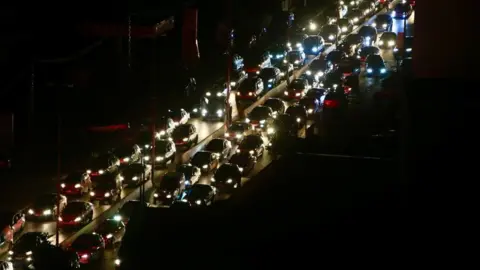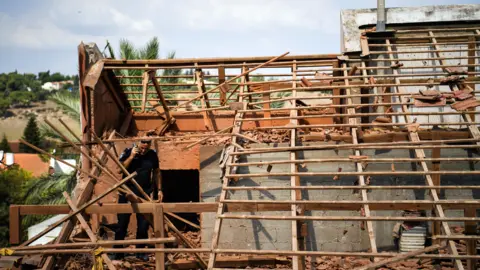At least 492 people have been killed in extensive Israeli airstrikes targeting Hezbollah positions in Lebanon, according to the country’s health ministry. This marks the deadliest day of conflict in the region in nearly two decades.
The Israeli military reported hitting 1,300 Hezbollah targets in an operation aimed at dismantling infrastructure the group has built since the 2006 war. The strikes have displaced thousands of families, forcing them to flee their homes.
In response, Hezbollah launched over 200 rockets into northern Israel, as reported by the Israeli military. Paramedics indicated that two people were injured by shrapnel.
Global leaders are urging restraint as tensions escalate, bringing both sides closer to a potential all-out war.
Lebanon’s health ministry stated that among the dead are 35 children and 58 women, with an additional 1,645 people wounded. The ministry did not specify how many of the casualties were civilians or combatants. Health Minister Firass Abiad noted that thousands of families have been displaced due to the strikes.
 EPA
EPAUN Secretary-General António Guterres expressed alarm over the escalating situation, stating he does not want Lebanon to “become another Gaza.” U.S. President Joe Biden mentioned that the United States is “working to de-escalate in a way that allows people to return home safely.” The Pentagon announced the deployment of a “small number” of additional troops to the Middle East as a precautionary measure.
Nearly a year of cross-border fighting between Israel and Hezbollah, sparked by the war in Gaza, has resulted in hundreds of deaths—mostly Hezbollah fighters—and displaced tens of thousands on both sides of the frontier. Hezbollah has stated it is acting in support of Hamas and will continue its actions until there is a ceasefire in Gaza. Both groups are backed by Iran and are designated as terrorist organizations by Israel, the UK, and other countries.
Pentagon spokesman Maj Gen Pat Ryder said, “In light of increased tension in the Middle East and out of an abundance of caution, we are sending a small number of additional U.S. military personnel forward to augment our forces that are already in the region.” He declined to provide further details.
Lebanese media reported that the initial wave of Israeli airstrikes began around 6:30 a.m. local time on Monday. “It was horrifying; the missiles flew over our heads. We woke up to the sound of bombings; we didn’t expect this,” one woman recounted.
Targets included dozens of towns, villages, and open areas throughout the districts of Sidon, Marjayoun, Nabatieh, Bint Jbeil, Tyre, Jezzine, and Zahrani in southern Lebanon, as well as Zahle, Baalbek, and Hermel in the eastern Bekaa Valley, according to the state-run National News Agency (NNA). In the evening, reports indicated that a building in the Bir al-Abed area of Beirut’s southern suburbs was hit by several missiles.
 Reuters
ReutersLebanese security sources stated that the strike targeted Hezbollah’s top commander in southern Lebanon, Ali Karaki, but it was unclear if he was killed. Hezbollah’s media office reported that Karaki was “fine” and had “moved to a safe place.”
Roads from the south to Beirut were congested as residents attempted to evacuate amid the bombardment and after receiving audio and text messages from the Israeli military warning them to leave buildings where Hezbollah was allegedly storing weapons. A family of four on a motorbike told the BBC during a brief stop on their way to Tripoli, “We just had to flee,” the father said anxiously.
Information Minister Ziad Makary said his ministry received an Israeli phone call urging evacuation of its building in Beirut but stated they would not comply with what he termed “a psychological war.” Prime Minister Najib Mikati told a cabinet meeting, “The continued Israeli aggression on Lebanon is a war of extermination in every sense of the word. We are working as a government to stop this new Israeli war and to avoid descending into the unknown.”
The Israel Defense Forces (IDF) announced that its aircraft had conducted strikes on approximately 1,300 Hezbollah “terror targets” in southern Lebanon and the Bekaa Valley, claiming that rockets, missiles, launchers, and drones were hidden there. IDF Chief of Staff Lt Gen Herzi Halevi stated, “We are targeting combat infrastructure that Hezbollah has been building for the past 20 years. This is very significant. Ultimately, everything is focused on creating the conditions to return the residents of the north to their homes.”
IDF spokesman Rear Adm Daniel Hagari noted that videos from southern Lebanon showed “significant secondary explosions caused by Hezbollah’s weapons that were being stored inside the buildings,” adding that some casualties might be from these secondary explosions.
Israeli Prime Minister Benjamin Netanyahu urged the people of Lebanon to “get out of harm’s way now,” accusing Hezbollah of using civilians as human shields by placing rockets and missiles in residential areas. “To defend our people against Hezbollah strikes, we must take out these weapons,” he said.
A senior Israeli military official stated that the IDF is “currently focusing on Israel’s aerial campaign only” when asked if a ground invasion of southern Lebanon was imminent. The official outlined Israel’s objectives: to reduce Hezbollah’s capability to fire rockets and missiles over the border, push its fighters back from the frontier, and destroy infrastructure built by Hezbollah’s elite Radwan Force that could be used to attack Israeli communities.
Hezbollah did not comment on the Israeli claims regarding hidden weapons in houses and had announced the death of only one fighter by Monday evening. However, the group stated it had responded to the “Israeli enemy’s attacks” by firing rockets at several Israeli military bases in northern Israel and a weapons manufacturing facility in the coastal Zvulun area, north of Haifa.
The IDF reported that by the evening, 210 projectiles had crossed from Lebanon, with some landing in the Lower Galilee and Upper Galilee regions, in Haifa and nearby areas, and in the occupied Golan Heights.
One house was significantly damaged by a rocket in Givat Avni, in the Lower Galilee. Resident David Yitzhak told the BBC that he, his wife, and six-year-old daughter were unharmed because they reached their home’s safe room just seconds after a warning siren sounded. “It’s a metre from life to death,” he said.
Israel’s ambulance service reported treating two people with shrapnel wounds in the Lower and Upper Galilee regions and another person injured while rushing to a shelter.
On Sunday, Hezbollah launched more than 150 rockets and drones across the border, while Israeli jets struck hundreds of targets in southern Lebanon. Despite what Israel’s defense minister described as “the most difficult week” for the group since its establishment, Hezbollah remains a significant force.
Earlier in the week, 39 people were killed, and thousands were wounded after explosions involving pagers and walkie-talkies used by Hezbollah. On Friday, Hezbollah reported that at least 16 members, including top commanders of its elite Radwan Force, were among 45 people killed in an Israeli airstrike in southern Beirut.
Speaking at a funeral on Sunday, Hezbollah’s deputy leader Naim Qassem said the group would not be deterred. “We have entered a new phase,” he said, “the title of which is the open-ended battle of reckoning.”
In Beirut, one young man told the BBC he was “very scared of the war escalating” because it would “cause a lot of disaster; it will stop students going to university.” Another man expressed defiance, saying, “We’re not scared; we have to stand tall; we have to defend ourselves.”



